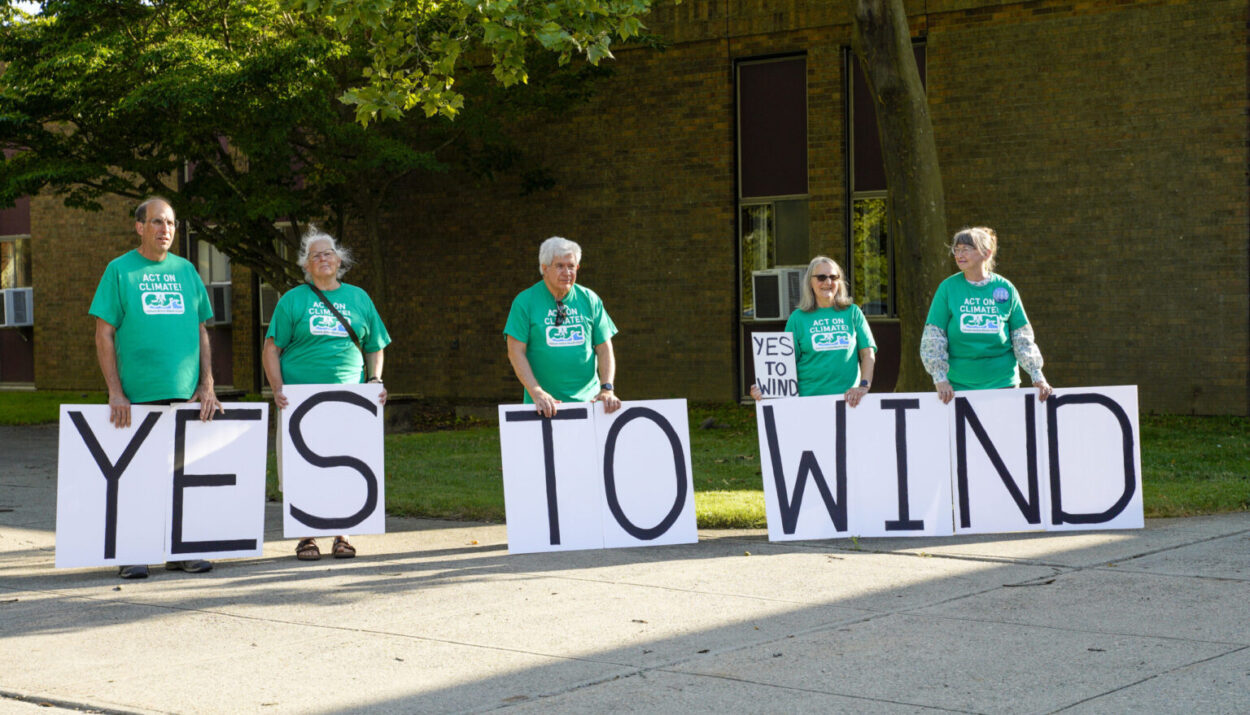This story was originally published in Rhode Island Current, a publication partner of Ocean State Stories.
PROVIDENCE — Rhode Island’s second attempt to grow its offshore wind portfolio is dead in the water.
Michael Dalo, a spokesperson for Rhode Island Energy, confirmed in an email to Rhode Island Current Friday morning that the company ended its negotiations with SouthCoast Wind to purchase power from the project.
The news comes more than a year after Rhode Island officials unveiled a tentative contract with SouthCoast Wind developers to buy 200 megawatts of electricity from the project planned south of Martha’s Vineyard and Nantucket. Negotiations finalizing the deal stalled multiple times due to a series of setbacks by the Trump administration, including the pullback of a key federal permit for the project.
Dalo cited the federal uncertainty facing the offshore wind industry as reason for the cutoff of contract negotiations.
“After several [power purchase agreement] negotiation extensions and continued uncertainty in the offshore wind industry, we were unable to come to agreeable terms” Dalo said in his email. “We remain fully supportive of the offshore wind industry and look forward to future clean energy [sic] opportunities as the industry evolves.”
He did not immediately respond to follow-up questions including when the deal was officially cast aside. The latest deadline, Nov. 1, came and went with no public acknowledgement from either party on the status of the talks.
SouthCoast Wind also did not immediately respond to inquiries for comment on Friday.
Disappointing, but not surprising, was how Amanda Barker, the Rhode Island state committee lead for New England for Offshore Wind, characterized the news.
“The current market uncertainty presents a challenge that we can’t ignore,” Barker said in an interview Friday. “It’s hard to sign a contract when they don’t know when they will get the federal permits they need to move forward.”
The 149-turbine project, proposed 60 miles south of Rhode Island, was also under tentative contract with Massachusetts utility companies to buy the rest of the 1,200 megawatts of nameplate capacity. Massachusetts officials worked in concert with Rhode Island and Connecticut to leverage bulk buying power in a first-of-its-kind tri-state solicitation for projects — even scheduling their contract negotiations to coincide with Rhode Island’s timeline. Connecticut ultimately opted not to proceed with any new contracts on offshore wind proposals, despite participating in the bid process.
Lauren Diggin, a spokesperson for Massachusetts Department of Energy Resources, confirmed in an email Friday that Massachusetts would continue its contract negotiations with SouthCoast, among other wind project developers.
“Massachusetts is pursuing an all-of-the-above approach – including offshore wind – to bring more energy into the state to meet rising demand,” Diggin said. “Offshore wind energy produced right here in Massachusetts will lower costs, create thousands of jobs, and give our electric grid needed winter reliability.”
Rhode Island’s deal, if finalized, would have provided enough electricity to power 125,000 homes if operating at full capacity. It follows the state’s contract for 400 megawatts of electricity from the Revolution Wind project, now nearing the end of construction in Rhode Island Sound. Environmental advocates and state energy leaders have touted the benefits of wind-powered electricity to smooth out seasonal utility bill spikes while helping meet Rhode Island’s decarbonization mandates, including the Act on Climate Law of 2021.
The sector has also been an touted for its economic benefits, providing thousands of union jobs along with private investments in port infrastructure and workforce training programs. The state’s economic future, and that of its union workers, looks much more precarious now, said Patrick Crowley, president of the Rhode Island AFL-CIO and co-chair of Climate Jobs RI.
“We were counting on thousands of jobs in this industry,” Crowley said in an interview Friday. “To have that thrown in jeopardy at a time when people are predicting another recession in 2026 is going to mean more jobs lost and more people waiting longer to get their next job.”
However, Crowley remained hopeful that with Massachusetts still committed, the SouthCoast project can stay afloat, offering employment and indirect energy benefits to Rhode Island.
“Even if Rhode Island doesn’t get a direct procurement out of the SouthCoast Wind project, I’m optimistic it will be built and we can use it as a way to keep the industry moving forward,” Crowley said.
Barker also noted that the region shares an electric grid, making any renewable electricity beneficial even for states not directly involved.
“We still believe wind will ultimately be New England’s leading source of electricity,” Barker said. “It’s not a question of ‘if,’ more a question of ‘when.’”
Gov. Dan McKee acknowledged the challenges facing the offshore wind industry and utility operations in an emailed response Friday.
“My administration is focused on an all of the above energy strategy that prioritizes affordability and reliability for Rhode Island families and businesses,” McKee said.
His office did not respond to follow up questions, including whether the state will start anew with a competitive solicitation for offshore wind proposals.
But the nascent offshore wind industry has faced headwinds under the Trump administration, which halted federal reviews on offshore wind projects on Trump’s first day in office. Setbacks mounted as federal regulators then set their sights on projects already past the federal approval stage, including Revolution Wind, which faced a monthlong pause in August that was later overturned by a federal judge’s order.
Meanwhile, federal regulators sought to revoke key permits for other projects, including the construction and operations plan for SouthCoast Wind granted in the waning days of the Biden administration.
On the same day a federal judge in D.C. granted the U.S. Bureau of Ocean Energy Management’s request to withdraw the permit for SouthCoast, Rhode Island energy regulators authorized the project developer’s request for a license to run underwater transmission lines up the Sakonnet River and out Mount Hope Bay. However, the Rhode Island Energy Facility Siting Board’s unanimous approval on Nov. 4 was conditioned upon the project receiving all federal and state approvals.






